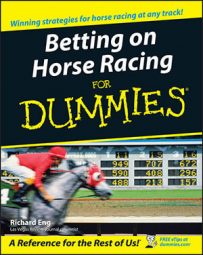Before the advent of parimutuel wagering, horse race betting was done with bookmakers. Bookmakers, also known as bookies, are essentially businesspeople that handle gambling bets — mainly on horse racing and sports. Bookmaking is now illegal in the United States, but it's a highly respected business in other parts of the world.
Betting on horse racing back then was easy because it was just straight wagering — win, place, and show. (Straight wagering refers to a bet on a single horse). Because this era was long before the computer age, betting on multiple horses or multiple races wasn't available. Profits to the bookmakers came in the form of a vigorish (also called vig) — a charge taken on bets — and the remainder of the money bet was paid out to winning bettors.
When the Federal government banned bookmakers, parimutuel wagering (betting against other bettors) took its place at the racetracks. When you bet on a horse and it wins, your profits come from the losing horseplayers who bet on other horses in the same race. That's the beauty of parimutuel wagering. Horseplayers are betting amongst each other, and if you're smarter than the people around you, you win their money.
The parimutuel system puts a tax on wagering called the takeout, which provides the revenues for the horse racing business to pay its bills. The racetrack has to pay for such expenses as overhead costs, the costs of maintaining the racetrack and property, employee wages, and most importantly, purse money (the money owners of the racehorses try to win).
Because horse owners need to win enough money to pay their bills, they want to run at racetracks that offer the best purses. Applying the system of supply and demand to horse racing, the bigger the purses, the better the quality and quantity of horses that run at that track. It's a spiral that keeps feeding itself.
In addition to the racetracks and horse owners, the government — local, state, and federal — profits from parimutuel wagering. Depending on the jurisdiction, the government receives a share of the takeout.
The parimutuel wagering system takes care of all parties' needs.
Comparing parimutuel wagering to poker
To best explain parimutuel wagering, compare it to the game of poker. In poker, you're betting against every other player at the card table. The theory is the same in horse racing. You're betting against all the other horseplayers in the parimutuel pool.
When you play poker in Las Vegas or in a card room, the house extracts a percentage of the ante (the stake each player puts in the pot) for itself. In horse racing, the equivalent is the takeout. After the percentage is taken out in poker, if you like the cards you hold in your hand, you bet and raise. Similarly, in horse racing, when you think the race has value, you bet into it. The poker play continues until the player with the best hand wins. The same goes in racing, where if you bet the best horse or horses and they run the best, you win.
The essence of playing poker and betting on horse racing is the same: You bet against all the other players. If you're smarter than the other players, you make money regardless of how much the house deducts from the antes or how much the racetrack takeout is.
Attracting a new gambling audience
A successful horseplayer must acquire two types of skills to win money: handicapping and betting. If forced to choose between which skill you'd be best off possessing, it's probably betting.
Lots of handicappers can dissect a horse race with great insight. But they can't construct wagers that'll make them money. On the other hand, lots of horseplayers can take good handicapping information from other sources and build wagers that give them an strong chance of winning money.
Parimutuel wagering is attracting a new gambling audience, because you can win even if you're a good but not great handicapper. If you know that the key to succeeding in the parimutuel wagering system is to find overlays (meaning horses going off at higher odds than their actual chance of winning), and you know how to wager to make money, you can rely on various sources to find good handicapping information and still win.

